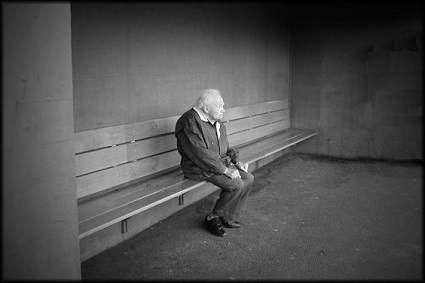January 30, 2018
Are You Lonesome Tonight?

In the wake of the 2107 Joe Cox Commission on loneliness report that concluded that more nine million people in the UK always or often feel lonely, Prime Minister Theresa May has appointed a minister for loneliness, in an effort to tackle social isolation.
The 2017 report was commissioned by the Red Cross in partnership with the Co-op - a cooperative supermarket chain - and published by the Cox Commission in December 2017.
"I want to confront this challenge for our society and for all of us to take action to address the loneliness endured by the elderly, by carers, by those who have lost loved ones, people who have no one to talk to or share their thoughts and experiences with," Prime Minster Theresa May said.
Loneliness can be characterized by a person's sense of lacking desired affection and closeness and lack of social interaction with others. However, there is also a subjective aspect of loneliness which depends on the individual's emotional state. Researchers have determined that loneliness is more dependent on the quality of relationships rather than the number of relationships.
While feeling lonely is part of the human condition, statistics suggest that the rates of loneliness are increasing, which means that some things are changing in society for the worse; for example, decreased social interactions and decreased responsibility for each other.
While loneliness is a concern for all age groups, the elderly - who often end up alone in their later years - suffer as much as anyone from the effects of being alone. The Cox Commission report found that over one million people over 65 said the often or always felt lonely. Nearly half of people in this age group said television or pets are their main form of company.
Only forty-six per cent of people over 65 said they spent time together with their family on most or every day, compared to 65 to 76 per cent for other ages. Moreover 12 per cent of people over 65 said they never spent time with their family at all. People in this age group also spent little time with friends: only 35 per cent spent time with friends most or every day in the last two weeks and 12 per cent spent no time at all.
While technology has increase our ability to connect with others, it's the type of communication and the opportunity cost of replacing other forms of communication that seems to be exasperating feelings of loneliness for many people - the elderly in particular - but including people of all age groups.
Christian Guy, director of the Centre for Social Justice think-tank, said: “It is ironic in a sense because we are becoming ever more connected in the way that we can communicate. But different forms of technology mean that we may feel close to a lot of people but how superficial is the new social order we are creating for ourselves?”
Recent research has found that heavy users of social media had higher levels of perceived social isolation.
“How many friends on Facebook would we actually recognize if we passed them in the street?” Mr. Guy asked. He added: “There is something British about wanting to deal with problems yourself. “Meanwhile people in the UK are not alone in feeling lonely. In a Harvard Business Review article, the 19th Surgeon General of the United States, Vivek Murthy, who served from 2014 to 2017, wrote that "Loneliness is a growing health epidemic. We live in the most technologically connected age in the history of civilization, yet rates of loneliness have doubled since the 1980s." He added that "Today, over 40 per cent of adults in America report feeling lonely, and research suggests that the real number may well be higher."
The feeling of loneliness can affect more than a person's quality of life. Loneliness can be harmful to our health: People with a high degree of loneliness are twice as likely to develop Alzheimer’s as people with a low degree of loneliness.
In fact, because of a number of negative health consequences, loneliness may even be considered a health epidemic. It may increase your risk of sleep disturbances, substance abuse, depression, and suicide. Loneliness may also increase your stress hormones and blood pressure and decrease your ability to cope with different obstacles and challenges. Moreover, routine things associated with maintaining a healthier lifestyle such as a healthy diet, physical activity, and seeing the doctor can be difficult when you don't have social support. Poor diet and lack of physical activity can increase stress levels, driving up blood pressure and inflammation that could lead to heart disease.
Studies have also shown that living alone -- or feeling lonely -- raises the likelihood of premature death.
At the same time, the Cox Commission report found that people who took part in more health-maintaining activities such as social interaction, physical exercise and a healthy diet were less likely to feel isolated and more likely to feel that their community was a good one to grow old in. A positive attitude also has long been touted as a significant factor in maintaining good health and a long life.








